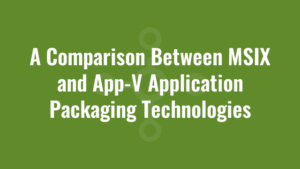Microsoft App-V and MSIX are both technologies for packaging and delivering applications, but they differ fundamentally. App-V uses virtualisation to separate apps from the OS at runtime, while MSIX employs containerisation, which keeps apps isolated at all times, even when they’re not running.
MSIX is a modern packaging solution that supports UWP (Universal Windows Platform) apps alongside traditional Win32 applications. It offers better security, efficient updates, and flexible deployment options, making it the preferred choice for contemporary environments.
Virtualisation vs. Containerisation
The core distinction between App-V and MSIX lies in how they isolate applications.
- App-V uses runtime virtualisation, which separates apps from the operating system while they are running. Once the app is closed, some aspects (like cached files) may still be exposed in the system.
- MSIX, on the other hand, provides permanent containerisation. It isolates the app entirely from the system, ensuring that files are kept within the container, providing both isolation and security at all times.
This containerisation approach is more aligned with modern security and deployment strategies, reducing system conflicts and enhancing stability.
Optimised Storage and Downloads
MSIX optimises storage and bandwidth by using a file hashing mechanism. When apps share common components, only a single copy of each file is stored and used across multiple apps or users. During app delivery or updates, the system checks for existing files and only downloads new or changed file blocks, leading to more efficient use of resources. In contrast, App-V may duplicate files across apps, leading to higher storage and bandwidth usage.
How Updates Are Handled
Updates in MSIX are highly efficient due to its delta update mechanism, which means only changed portions of the app are downloaded. This results in smaller, faster updates, minimising disruptions and reducing bandwidth usage. For App-V, updating an application typically requires the full package to be downloaded and delivered to the client, which can be slower and more resource-intensive.
The difference in how updates are handled is one of the reasons why MSIX is favoured for modern app management, especially in environments with frequent updates or limited network capacity.
Signing and Security
MSIX mandates that all packages be digitally signed, which ensures the authenticity and integrity of the application. This makes MSIX more secure by preventing tampered or unauthorised applications from running. App-V, however, does not require digital signing, making it less secure in comparison.
By enforcing signed packages, MSIX ensures that only trusted applications are installed, providing a significant advantage in environments where security is a top concern.
MSIX App Attach and Dynamic Application Delivery
MSIX supports dynamic application delivery through MSIX app attach, particularly in virtual desktop environments like Azure Virtual Desktop. With MSIX app attach, apps don’t need to be permanently installed. Instead, they are dynamically “attached” to a session when a user interacts with them, such as by clicking an app shortcut. This enables on-demand application delivery, minimising storage usage and streamlining management in virtualised environments. It also enhances scalability, making it easier to deploy and manage apps across multiple users without needing to pre-install them.
This approach is a game-changer for large organisations and virtual desktop environments, allowing for rapid application access without the overhead of installing apps for each user.
In summary, while both App-V and MSIX provide application delivery solutions, MSIX stands out with its modern features like containerisation, efficient updates, and robust security. Its support for UWP and dynamic application delivery through app attach makes it the ideal choice for modern IT environments looking to streamline app management and improve security.





